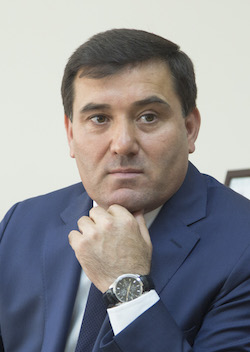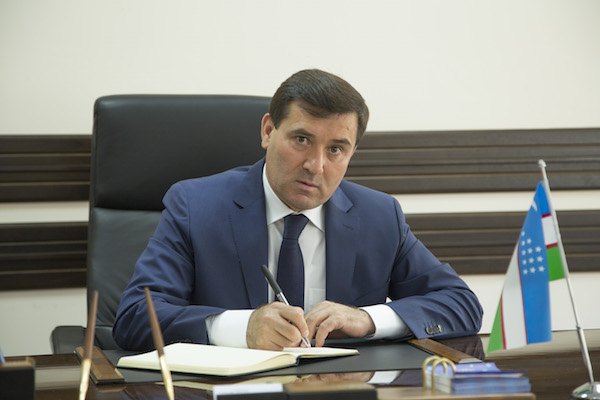 Chori Mirzaev
Chori Mirzaev
Chairman of the Board
JSC Turonbank, Uzbekistan
Transition Economy Program (’00)
Please tell us about your career path so far. What is your area of specialization and how did you come to work in this area?
First of all, thank you very much for giving me the opportunity to update you about my career and to share my impressions of my time in Japan. I was born on May 23, 1971 in Sariosiyo district of Surkhandarya region of the Republic of Uzbekistan. In 1995, I graduated from the Faculty of International Economic Relations of Tashkent State University of Economics. Immediately after my graduation, I started working in the Central Bank of the Republic of Uzbekistan, holding several positions starting from specialist of the 1st category, chief specialist, head of division, and director of department. In 1998, I was selected to study in the IMF-sponsored Transition Economy Program at the Graduate School of Policy Science (GSPS), Saitama University, GRIPS’ predecessor. At GSPS I studied mainly economics, and also the history and economy of Japan. Upon my return to Uzbekistan 2000, I re-joined the Central Bank and became the Deputy Head of the Department of Currency Regulation and Foreign Relations. In 2008, I moved to the Korean Development Bank in Uzbekistan (UzKDB Bank CJSC) where I was appointed as a Deputy Chairman, and in 2010 I shifted to the JSC Asaka bank to become the Head of Credit Department. I have been working at the JSC Turonbank since 2015, initially as Deputy of Chairman of the Board, and since September 2016 as Chairman of the Board.
 JSC “Turonbank” was established on November 6, in 1990 and is considered one of the first commercial banks (there are now 28 commercial banks) that started its activities in Uzbekistan after gaining independence. By overcoming difficulties it became a stable support for many people, businesses and the financial system of Uzbekistan. It gradually gained new features and adopted modern methods of banking system. Currently “Turonbank” serves more than a million private clients and over twenty thousand business clients. The bank’s structure includes 18 branches throughout Uzbekistan providing the full range of banking services. In 2013, the financial journal The Banker awarded “Turonbank” with the “Best Bank of the Year” nomination. In a nomination of active banks Thomson Reuters recognized “Turonbank” as the best bank of 2013. On June 23, 2014, during the ceremony «The New Era Award for Technology, Innovation and Quality» in Rome, “Turonbank” was awarded for innovative banking services. Standard and Poor’s, an international agency, rated “Turonbank” with a B-/B as STABLE. This is the result of the team’s hard work during all the years of our growth and progress.
JSC “Turonbank” was established on November 6, in 1990 and is considered one of the first commercial banks (there are now 28 commercial banks) that started its activities in Uzbekistan after gaining independence. By overcoming difficulties it became a stable support for many people, businesses and the financial system of Uzbekistan. It gradually gained new features and adopted modern methods of banking system. Currently “Turonbank” serves more than a million private clients and over twenty thousand business clients. The bank’s structure includes 18 branches throughout Uzbekistan providing the full range of banking services. In 2013, the financial journal The Banker awarded “Turonbank” with the “Best Bank of the Year” nomination. In a nomination of active banks Thomson Reuters recognized “Turonbank” as the best bank of 2013. On June 23, 2014, during the ceremony «The New Era Award for Technology, Innovation and Quality» in Rome, “Turonbank” was awarded for innovative banking services. Standard and Poor’s, an international agency, rated “Turonbank” with a B-/B as STABLE. This is the result of the team’s hard work during all the years of our growth and progress.
What are your main roles and responsibilities as Chairman of the Board?
As Chairman of the Board my main role is to efficiently conduct the activities of the bank and by this way add its own contribution to the economy of Uzbekistan.
My main responsibilities are the following:
- Within the competence, manage the current activities of the bank and ensure an efficient and sustainable operation, with the exception of matters attributed to competence of the General meeting of shareholders and the Council of the bank;
- To organize the implementation of the decisions of the General meeting of shareholders and the Council of the bank;
- To submit the quarterly reports on the execution of program and business plans to the General meeting of shareholders and the Council of the bank;
- To manage the development of the program and business plans of the bank, organize and monitor their execution;
- Ensure an effective interaction between the Bank’s structural units and coordinate them all and others.
In your current capacity, what do you see as the main opportunities and challenges for Uzbekistan over the course of the next five to ten years?
According to the Uzbekistan’s Development Strategy for 2017-2021, the priority areas of Uzbekistan are the improvement of state and social structures, ensuring the rule of law and reforming the judicial system, development and liberalization of the economy, development of the social sphere and ensuring security of the country. This strategy includes the development of the financial system, as well as commercial banks.
What are some of the biggest challenges you face in your work? And what have been the most interesting or rewarding aspects of your career thus far?
The most rewarding aspects in my career is that after graduating from GRIPS, I had a chance to work in high positions in the Central bank of the Republic of Uzbekistan, CJSC UzKDB, JSC Asaka and currently in JSC Turonbank. And nowadays I believe that all I have achieved during my life is thanks to the knowledge and experience gained at GRIPS. It really helps us during our career.
What led you to GRIPS/GSPS? What is the most important thing you got out of your studies here, and how has your experience at GRIPS prepared you for future endeavours?
During my education we had many study trips all over Japan and visited many manufacturing factories, cultural places and historical buildings to study practical aspects of economy, history and national traditions of Japan. My experience from Japan is that this country has unbelievably high economic development. That made me really impressed. Regarding traditions, I found out that Uzbek and Japanese have many similar traditions and cultures. And I am very grateful to the Japanese for their peaceful reception. I will always keep their kindness and generosity in my memories.
How do you maintain a balance between your work and the rest of your life? And what is your favorite thing to do when you are not working?
I love to work and communicate with my colleagues. My current work demands a lot of time from me. But despite that, I try to make time to spend with my family. I also like reading books, especially bestsellers of our national and world writers.
What are some of your fondest memories of your time spent at GRIPS? And what do you miss about Japan?
My best memories of my time at GRIPS are the opportunities offered during our study to visit many places throughout Japan. During these visits, we met with scientists, professors and experts who showed us their latest innovations in science and technology, which were introduced to improve the production of goods and manufacturing processes in factories. We really learned a lot from those visits. This was a great experience and I am sure it has helped many of us in their future careers.
If you could give one piece of advice to anyone considering studying at GRIPS what would it be?
To anyone going to study in GRIPS I would advise to make the most of the opportunity to meet with people from so many other nations. They will help you broaden your horizon. This is not only a great chance to study economics and politics, but also to get acquainted with high level manufacturing processes and their technical and practical aspects. And I am sure studying in GRIPS will be a great way towards opening up new opportunities in your future career.
How would you like to maintain involved with the School? What do you expect from GRIPS as an alumnus and do you have any suggestions on how to further utilize the GRIPS alumni network?
- We studied at GRIPS in Japan for 1,5 years from 1998 to 2000 and during this period we became really close to each other, sharing a lot of memories. In this regard, it would be great if GRIPS would organize a meeting or video-call conference with alumni at least once every 6 months or year.
- I hope that the representatives of GRIPS will also choose candidates among employees of “Turonbank” for studying in Japan That would be a great opportunity to obtain modern knowledge in economic systems.




